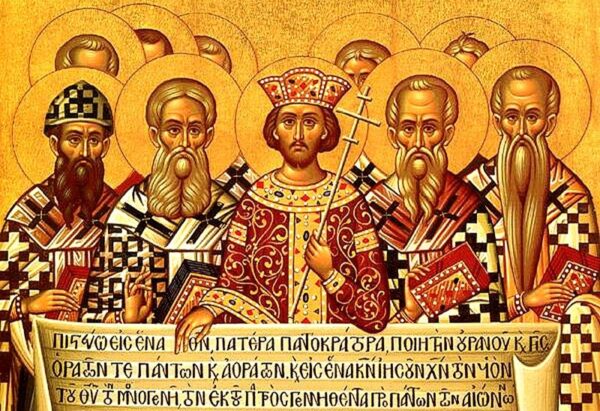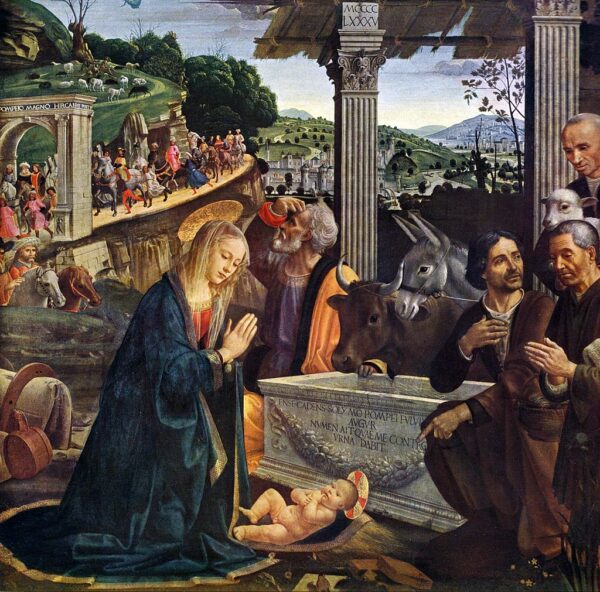by Dr Taylor Marshall
The Catholic Church, from at least the second century, has claimed that
Christ was born on December 25. However, it is commonly alleged that our
Lord Jesus Christ was not born on December 25. For the sake of
simplicity, let us set out the usual objections to the date of December
25 and counter each of them.
Objection 1: December 25 was chosen in
order to replace the pagan Roman festival of Saturnalia. Saturnalia was
a popular winter festival and so the Catholic Church prudently
substituted Christmas in its place.
Reply to Objection 1: Saturnalia
commemorated the winter solstice. Yet the winter solstice falls on
December 22. It is true that Saturnalia celebrations began as early as
December 17 and extended till December 23. Still, the dates don’t match
up.
Objection 2: December 25 was chosen to
replace the pagan Roman holiday Natalis
Solis Invicti which means “Birthday of the Unconquered Sun.”
Reply to Objection 2: Let us examine
first the cult of the Unconquered Sun. The Emperor Aurelian introduced
the cult of the Sol Invictus or Unconquered
Sunto Rome in A.D. 274. Aurelian found political traction with this
cult, because his own name Aurelianderives
from the Latin word aurora denoting
“sunrise.” Coins reveal that Emperor Aurelian called himself the Pontifex
Solis or Pontiff of the
Sun. Thus, Aurelian simply accommodated a generic solar cult and
identified his name with it at the end of the third century.
Most importantly, there is no historical record for a celebration Natalis
Sol Invictus on December 25 prior to A.D. 354. Within an illuminated
manuscript for the year A.D. 354, there is an entry for December 25
reading “N INVICTI CM XXX.” Here N means “nativity.” INVICTI means “of
the Unconquered.” CM signifies “circenses missus” or “games ordered.”
The Roman numeral XXX equals thirty. Thus, the inscription means that
thirty games were order for the nativity of the Unconquered for December
25th. Note that the word “sun” is not present. Moreover, the very same
codex also lists “natus Christus in Betleem Iudeae” for the day of
December 25. The phrase is translated as “birth of Christ in Bethlehem
of Judea.”[i]
The date of December 25th only became the “Birthday of the Unconquered
Sun” under the Emperor Julian the Apostate. Julian the Apostate had been
a Christian but who had apostatized and returned to Roman paganism.
History reveals that it was the hateful former Christian Emperor that
erected a pagan holiday on December 25. Think about that for a moment.
What was he trying to replace?
These historical facts reveal that the Unconquered Sun was not likely a
popular deity in the Roman Empire. The Roman people did not need to be
weaned off of a so-called ancient holiday. Moreover, the tradition of a
December 25th celebration does not find a place on the Roman calendar until
after the Christianization of Rome. The “Birthday of the Unconquered
Sun” holiday was scarcely traditional and hardly popular. Saturnalia
(mentioned above) was much more popular, traditional, and fun. It seems,
rather, that Julian the Apostate had attempted to introduce a pagan
holiday in order to replace the Christian one!
Objection 3: Christ could not have been
born in December since Saint Luke describes shepherds herding in the
neighboring fields of Bethlehem. Shepherds do not herd during the
winter. Thus, Christ was not born in winter.
Reply to Objection 3: Recall that
Palestine is not England, Russia, or Alaska. Bethlehem is situated at
the latitude of 31.7. My city of Dallas, Texas has the latitude of 32.8,
and it’s still rather comfortable outside in December. As the great
Cornelius a Lapide remarks during his lifetime, one could still see
shepherds and sheep in the fields of Italy during late December, and
Italy is at higher latitude than Bethlehem.
Now we move on to establishing the birthday of Christ from Sacred
Scripture in two steps. The first step is to use Scripture to determine
the birthday of Saint John the Baptist. The next step is using Saint
John the Baptist’s birthday as the key for finding Christ’s birthday. We
can discover that Christ was born in late December by observing first
the time of year in which Saint Luke describes Saint Zacharias in the
temple. This provides us with the approximate conception date of Saint
John the Baptist. From there we can follow the chronology that Saint
Luke gives, and that lands us at the end of December.
Saint Luke reports that Zacharias served in the “course of Abias” (Lk
1:5) which Scripture records as the eighth course among the twenty-four
priestly courses (Neh 12:17). Each shift of priests served one week in
the temple for two times each year. The course of Abias served during
the eighth week and the thirty-second week in the annual cycle.[ii]However,
when did the cycle of courses begin?
Josef Heinrich Friedlieb has convincingly established that the first
priestly course of Jojarib was on duty during the destruction of
Jerusalem on the ninth day of the Jewish month of Av.[iii]Thus
the priestly course of Jojarib was on duty during the second week of Av.
Consequently, the priestly course of Abias (the course of Saint
Zacharias) was undoubtedly serving during the second week of the Jewish
month of Tishri—the very week of the Day of Atonement on the tenth day
of Tishri. In our calendar, the Day of Atonement would land anywhere
from September 22 to October 8.
Zacharias and Elizabeth conceived John the Baptist immediately after
Zacharias served his course. This entails that Saint John the Baptist
would have been conceived somewhere around the end of September, placing
John’s birth at the end of June, confirming the Catholic Church’s
celebration of the Nativity of Saint John the Baptist on June 24.
The second-century Protoevangelium of
Saint James also confirms a late September conception of the Baptist
since the work depicts Saint Zacharias as High Priest and as entering
the Holy of Holies—not merely the holy place with the altar of incense.
This is a factual mistake because Zacharias was not the high priest, but
one of the chief priests.[iv]Still,
the Protoevangelium regards Zacharias
as a high priest and this associates him with the Day of Atonement,
which lands on the tenth day of the Hebrew month of Tishri (roughly the
end of our September). Immediately after this entry into the temple and
message of the Archangel Gabriel, Zacharias and Elizabeth conceive John
the Baptist. Allowing for forty weeks of gestation, this places the
birth of John the Baptist at the end of June—once again confirming the
Catholic date for the Nativity of Saint John the Baptist on June 24.
The rest of the dating is rather simple. We read that just after the
Immaculate Virgin Mary conceived Christ, she went to visit her cousin
Elizabeth who was six months pregnant with John the Baptist. This means
that John the Baptist was six months older that our Lord Jesus Christ
(Lk 1:24-27, 36). If you add six months to June 24 you get December
24-25 as the birthday of Christ. Then, if you subtract nine months from
December 25 you get that the Annunciation was March 25. All the dates
match up perfectly. So then, if John the Baptist was conceived shortly
after the Jewish Day of the Atonement, then the traditional Catholic
dates are essentially correct. The birth of Christ would be about or on
December 25.
Sacred Tradition also confirms December 25 as the birthday of the Son of
God. The source of this ancient tradition is the Blessed Virgin Mary
herself. Ask any mother about the birth of her children. She will not
only give you the date of the birth, but she will be able to rattle off
the time, the location, the weather, the weight of the baby, the length
of the baby, and a number of other details. I’m the father of six
blessed children, and while I sometimes forget these details—mea
maxima culpa—my wife never does. You see, mothers never forget the
details surrounding the births of their babies.
Now ask yourself: Would the Blessed Virgin Mary ever forget the birth of
her Son Jesus Christ who was conceived without human seed, proclaimed by
angels, born in a miraculous way, and visited by Magi? She knew from the
moment of His incarnation in her stainless womb that He was the Son of
God and Messiah. Would she ever forget that day?[v]
Next, ask yourself: Would the Apostles be interested in hearing Mary
tell the story? Of course they would. Do you think the holy Apostle who
wrote, “And the Word was made flesh,” was not interested in the minute
details of His birth? Even when I walk around with our seven-month-old
son, people always ask “How old is he?” or “When was he born?” Don’t you
think people asked this question of Mary?
So the exact birth date (December 25) and the time (midnight) would have
been known in the first century. Moreover, the Apostles would have asked
about it and would have, no doubt, commemorated the blessed event that
both Saint Matthew and Saint Luke chronicle for us. In summary, it is
completely reasonable to state that the early Christians both knew and
commemorated the birth of Christ. Their source would have been His
Immaculate Mother.
Further testimony reveals that the Church Fathers claimed December 25 as
the Birthday of Christ prior to the
conversion of Constantine and the Roman Empire. The earliest record of
this is that Pope Saint Telesphorus (reigned A.D. 126-137) instituted
the tradition of Midnight Mass on Christmas Eve. Although the Liber
Pontificalis does not give us the date of Christmas, it assumes that
the Pope was already celebrating Christmas and that a Mass at midnight
was added. During this time, we also read the following words of
Theophilus (A.D. 115-181), Catholic bishop of Caesarea in Palestine: “We
ought to celebrate the birthday of Our Lord on what day soever the 25th
of December shall happen.”[vi]
Shortly thereafter in the second century, Saint Hippolytus (A.D.
170-240) wrote in passing that the birth of Christ occurred on December
25:
The First Advent of our Lord in the flesh occurred when He was born in
Bethlehem, was December 25th, a Wednesday, while Augustus was in his
forty-second year, which is five thousand and five hundred years from
Adam. He suffered in the thirty-third year, March 25th, Friday, the
eighteenth year of Tiberius Caesar, while Rufus and Roubellion were
Consuls.[vii]
Also note in the quote above the special significance of March 25, which
marks the death of Christ (March 25 was assumed to corresponded to the
Hebrew month Nisan 14 – the traditional date of crucifixion).[viii] Christ,
as the perfect man, was believed to have been conceived and died on the
same day—March 25. In his Chronicon,
Saint Hippolytus states that the earth was created on March 25, 5500
B.C. Thus, March 25 was identified by the Church Fathers as the
Creation date of the universe, as the date of the Annunciation and
Incarnation of Christ, and also as the date of the Death of Christ our
Savior.
In the Syrian Church, March 25 or the Feast of the Annunciation was seen
as one of the most important feasts of the entire year. It denoted the
day that God took up his abode in the womb of the Virgin. In fact, if
the Annunciation and Good Friday came into conflict on the calendar, the
Annunciation trumped it, so important was the day in Syrian tradition.
It goes without saying that the Syrian Church preserved some of the most
ancient Christian traditions and had a sweet and profound devotion for
Mary and the Incarnation of Christ.
Now then, March 25 was enshrined in the early Christian tradition, and
from this date it is easy to discern the date of Christ’s birth. March
25 (Christ conceived by the Holy Ghost) plus nine months brings us to
December 25 (the birth of Christ at Bethlehem).
Saint Augustine confirms this tradition of March 25 as the Messianic
conception and December 25 as His birth:
For Christ is believed to have been conceived on the 25th of March, upon
which day also he suffered; so the womb of the Virgin, in which he was
conceived, where no one of mortals was begotten, corresponds to the new
grave in which he was buried, wherein was never man laid, neither before
him nor since. But he was born, according to tradition, upon December
the 25th.[ix]
In about A.D. 400, Saint Augustine also noted how the schismatic
Donatists celebrated December 25 as the birth of Christ, but that the
schismatics refused to celebrate Epiphany on January 6, since they
regarded Epiphany as a new feast without a basis in Apostolic Tradition.
The Donatist schism originated in A.D. 311 which may indicate that the
Latin Church was celebrating a December 25 Christmas (but not a January
6 Epiphany) before A.D. 311. Whichever is the case, the liturgical
celebration of Christ’s birth was commemorated in Rome on December 25
long before Christianity became legalized and long before our earliest
record of a pagan feast for the birthday of the Unconquered Sun. For
these reasons, it is reasonable and right to hold that Christ was born
on December 25 in 1 B.C. and that he died and rose again in March of
A.D. 33.
[i] The
Chronography of AD 354. Part 12: Commemorations
of the Martyrs. MGH Chronica
Minora I (1892), pp. 71-2.
[ii] I realize that there are two
courses of Abias. This theory only works if Zacharias and
Elizabeth conceived John the Baptist after Zacharias’ second
course – the course in September. If Saint Luke refers to the
first course, this then would place the birth of John the
Baptist in late Fall and the birth of Christ in late Spring.
However, I think tradition and the Protoevangelium substantiate
that the Baptist was conceived in late September.
[iii] Josef Heinrich Friedlieb’s Leben
J. Christi des Erlösers. Münster, 1887, p. 312.
[iv] The Greek tradition especially
celebrates Saint Zacharias as “high priest.” Nevertheless,
Acts 5:24 reveals that there were several “chief priests” (ἀρχιερεῖς),
and thus the claim that Zacharias was a “high priest” may not
indicate a contradiction. The Greek tradition identifies
Zacharias as an archpriest and martyr based on the narrative of
the Protoevangelium of James and Matthew 23:35: “That upon you
may come all the just blood that hath been shed upon the earth,
from the blood of Abel the just, even unto the blood of
Zacharias the son of Barachias, whom you killed between the
temple and the altar.” (Matthew 23:35)
[v] A special thanks to the Reverend
Father Phil Wolfe, FSSP for bringing the “memory of Mary”
argument to my attention.
[vi] Magdeburgenses,
Cent. 2. c. 6. Hospinian, De
origine Festorum Chirstianorum.
[vii] Saint Hippolytus of Rome, Commentary
on Daniel.
[viii] There is some discrepancy in the
Fathers as to whether Nisan 14/March 25 marked the death of
Christ or his resurrection.
[ix] Saint Augustine, De
trinitate, 4, 5.



